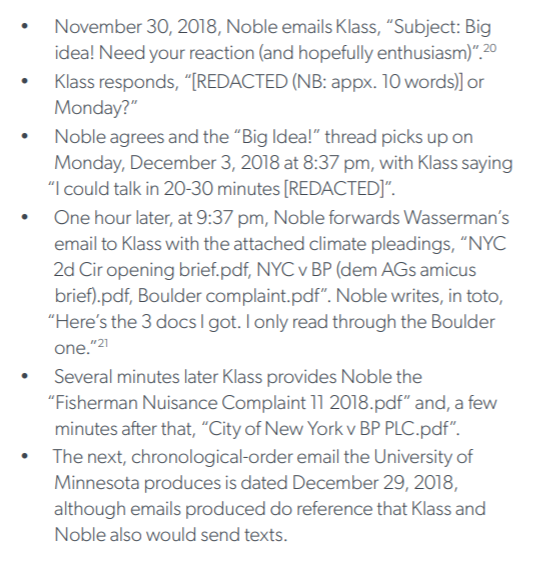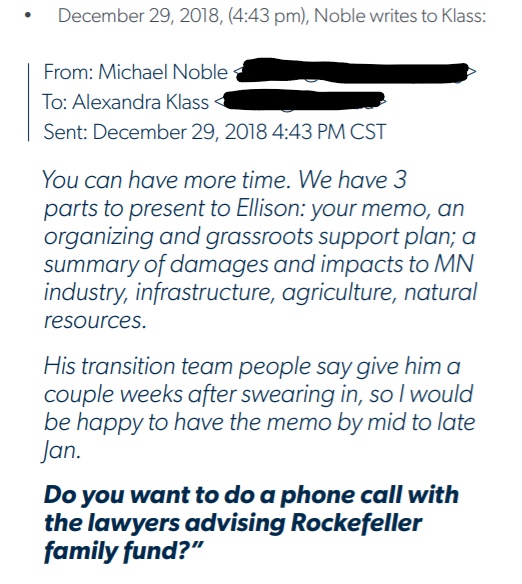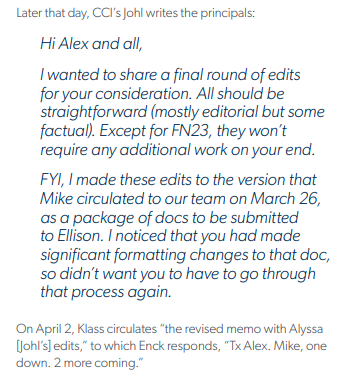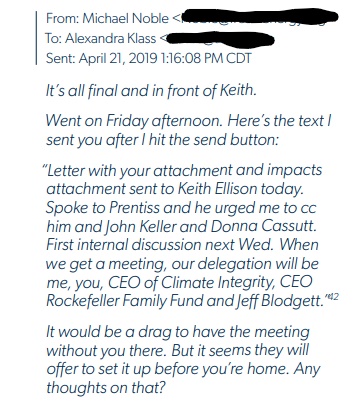Activist groups Center for Climate Integrity and Fresh Energy, key players in the climate litigation campaign, are running the show in Minnesota – from both the inside and the outside.
On Thursday, these two groups joined other litigation proponents in filing a “Friend of the Court” brief in support of Attorney General Keith Ellison’s climate lawsuit.
These types of filings are almost always submitted by individuals and organizations that play no direct role in the case, whether for the plaintiffs or the defendants, but that simply want to show their support for one side or the other. As Cornell Law explains:
“Frequently, a person or group who is not a party to an action, but has a strong interest in the matter, will petition the court for permission to submit a brief in the action with the intent of influencing the court’s decision. Such briefs are called ‘amicus briefs.’” (emphasis added)
The issue here? CCI and Fresh Energy are 100 percent “a party to an action” in Minnesota by playing a direct role in orchestrating Ellison’s case behind-the-scenes and now they’re working to dial up the echo chamber of support for the lawsuit from the outside. Neither group makes any mention in the brief of their role in formulating the lawsuit they’re now rendering their support of.
CCI and Fresh Energy Recruited Ellison
In the summer of 2020, shortly after Ellison introduced his lawsuit, Fresh Energy director Michael Noble bragged on a public webinar that he and CCI officials personally approached Ellison. Noble said:
“I want to first just acknowledge that [Center for Climate Integrity] is a national organization that leads on this kind of climate liability, climate litigation. And they brought this concept to Fresh Energy in the fall of 2018, and Fresh Energy helped put this idea in front of Attorney General Keith Ellison shortly after he was sworn in.”
It doesn’t get any more direct than “helped put this idea in front of Attorney General Keith Ellison” and shows that this case might have never been introduced in the first place without the urging of these activist groups.
CCI and Fresh Energy Provided Critical Resources
Not only did CCI and Fresh Energy recruit Ellison, but these groups also helped supply critical legal and organizational resources to get the case off the ground.
According to emails obtained through public records request, in the spring of 2019, the Rockefeller Family Fund’s Lee Wasserman (who has funded and manufactured much of the climate litigation campaign) helped Noble enlist University of Minnesota Law professor Alexandra Klass to write a memo that provided legal justification for such a lawsuit. An in-depth report from the non-profit Government Accountability & Oversight detailed this coordination:


(Images via Government Accountability & Oversight)
After Klass wrote the memo, Noble sought edits from none other than Alyssa Johl, a top lawyer with CCI, before it was finally delivered to Ellison’s office:


(Images via Government Accountability & Oversight)
Later in 2019, after the memo was finished, Klass and Ellison participated in a panel that was organized by Fresh Energy and CCI and sought to generate public support for the forthcoming lawsuit.
Eight months later when Ellison introduced his climate lawsuit, he failed to disclose the role that Klass, Fresh Energy, and CCI played in preparing and orchestrating his case.
“Proud To Be Activists”
For supporters of the climate litigation campaign, the filing of the “Friend of the Court” brief shows that activists are operating both behind the scenes with local and state governments and as outside boosters of the echo chamber.
That attitude was summed up well by Geoffrey Supran, a Harvard researcher who also signed the filing, in an E&E News story on the court brief:
“Asked to respond to these allegations, Supran said that the post ‘accuses us of being activists as though that’s something to be ashamed of. But we are proud to be activists. Active in doing what we can to address the climate crisis, and active in uncovering the truth about the fossil fuel industry’s decades of denial and delay.’” (emphasis added)
Supran, along with Naomi Oreskes, a Harvard professor and yet another signee of the court filing, have published multiple flawed analyses that they have peddled as objective and non-biased research on the climate communications of energy companies. Oreskes is also on retainer with Sher Edling – the San Francisco-based law firm that’s serving as outside counsel for Ellison’s office and which stands to make millions from a favorable verdict.
Yet, here are they in the media, claiming that they are no mere university researchers, but subjective, biased, and agenda-driven activists who are using the guise of academia to try to take down American energy companies.
Conclusion
The filing makes clear that these activists are trying to have it both ways. Are Supran and Oreskes “scholars and scientists with strong interests, education, and experience in the environment and the science of climate change,” as they state in their brief? Or are they “proud” activists who have accused the energy companies of guilt long before the first lawsuit was filed and before they began their supposedly objective studies.
Likewise, are CCI and Fresh Energy third parties supporting a lawsuit, or are they the covert authors of the very same litigation?
The amici accuse energy companies of “running misleading marketing campaigns and funding scientists and third-party organizations” as part of a “coordinated, multi-front effort, demonstrated by their own documents and actions.” They just hope no one notices all the evidence of their own coordinated, multi-front efforts to fund scientists and third-party organizations to support their baseless claims.